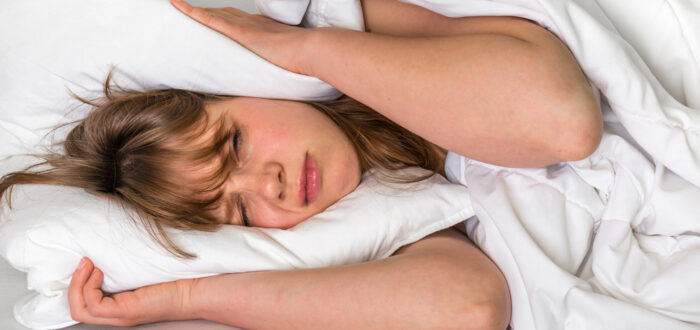Tinnitus is the perception of sound when no actual external noise is present. A person with tinnitus would commonly refer to it as “ringing in the ears,” but it can manifest in many different forms, including buzzing, hissing, whistling, swooshing, and clicking sounds.
Tinnitus is a condition that affects millions of Americans. According to the National Institute on Deafness and Other Communication Disorders (NIDCD), approximately 25 million Americans suffer from tinnitus.
While tinnitus can be bothersome during the day, it often becomes more pronounced and disruptive at night when the world around us quiets down. Managing tinnitus-related sleep disturbances is crucial for our overall well-being, as quality sleep is essential for our physical and mental health. Let’s explore a few practical tips and strategies for improving sleep for individuals experiencing ringing ears.
Understanding Tinnitus and its Impact on Sleep
Tinnitus can vary in intensity and pitch and is usually caused by an underlying condition, such as age-related hearing loss, an ear injury, or a medical condition. The exact mechanisms behind tinnitus-related sleep disturbances are not fully understood, but they may include heightened awareness of the tinnitus sound due to the absence of other ambient noise, anxiety or stress linked to the condition, and/or changes in brain activity during sleep.
Practical Tips for Managing Tinnitus at Night
- Create a Relaxing Bedtime Routine:
- Establish a calming bedtime routine to signal to your body that it’s time to wind down.
- Activities such as gentle stretching, deep breathing exercises, or reading a book can help relax your mind and body.
- Use White Noise or Sound Machines:
- White noise or nature sound machines can provide background noise that distracts from the tinnitus.
- These devices create a soothing environment and make the tinnitus less noticeable.
- Consider Tinnitus Maskers:
- Tinnitus maskers are devices that produce a low-level sound that can help mask the ringing in your ears.
- Consult with an audiologist to determine if a tinnitus masker is suitable for your needs.
- Manage Stress and Anxiety:
- Stress and anxiety can exacerbate tinnitus and disrupt sleep.
- Practices such as meditation, mindfulness, or yoga can help reduce stress levels and improve sleep quality.
- Avoid Stimulants Before Bed:
- Limit the consumption of caffeine and nicotine in the hours leading up to bedtime, as they can interfere with sleep.
- Maintain a Consistent Sleep Schedule:
- Try to go to bed and wake up at the same time every day, even on weekends.
- Consistency can help regulate your body’s internal clock and improve sleep quality.
- Limit Exposure to Electronic Screens:
- The blue light emitted by phones, tablets, and computers can interfere with the production of melatonin, a hormone that regulates sleep.
- Avoid screens at least an hour before bedtime.
- Seek Professional Help:
- If your tinnitus is severely affecting your sleep and quality of life, consult with your local hearing specialists or healthcare provider.
- They can help determine the underlying cause of your tinnitus and recommend appropriate treatments.
Tinnitus-related sleep disturbances can be challenging, but with the right strategies and support, individuals experiencing ringing ears can improve their sleep quality and overall well-being. It’s important to remember that managing tinnitus at night is a personalized journey, and what works best may vary from person to person.
By incorporating these practical tips and seeking professional guidance when needed, you can take positive steps toward a restful night’s sleep despite the presence of tinnitus.
Contact Us Today!Your hearing health is important to us. If you are having trouble with ringing in your ears, contact the Audiology Professionals team by calling (541) 228-9233. Alternatively, click here to contact us online.

